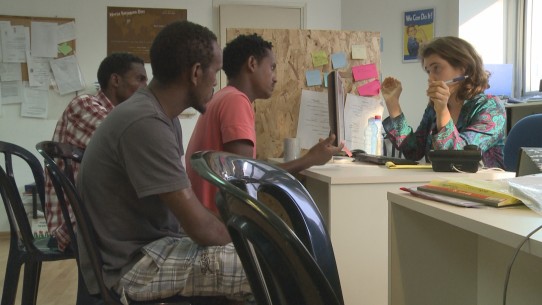Born in Argentina in 1965, Silvina Landsmann emigrated to Israel with her family at the age of eleven. After studying psychology in Paris and math in Tel Aviv, she graduated from Tel Aviv University’s Cinema Department. She has lived and worked in Paris for ten years, where she directed her first film, Collège. Back in Israel, she set up Comino Films in order to produce her own projects, such as Avo Ba-Mechilot (Unto Thy Land) and Bagrut Lochamim (Soldier/Citizen). She is the mother of three girls. (Press Materials)
Hotline will premiere at the 2015 Berlin International Film Festival on February 7.
W&H: Please give us your description of the film playing.
SL: The [documentary] is about the daily work of a small human rights NGO based in Tel Aviv, The Hotline for Refugees and Migrants.
W&H: What drew you to the story?
SL: The issues of migration and the appearance of NGOs in the political arena have interested me for many years. After finishing Soldier/Citizen, I wanted to dive inside one of the NGOs whose clients are migrants. But this is on a general level.
Then there is the coincidence, or how things “just happen.” I’m always thrilled by it. For example, when I phoned the Hotline to set up a meeting to see if it would be a good idea to try and make a film about their work, I never imagined I would already be filming the day after. In fact, that meeting never happened. I was literally swallowed by them.
W&H: What was the biggest challenge in making the film?
SL: Maybe accepting that I would not be able to film most of the places where the Hotline is active: inside the prisons, in the court rooms, at the Ministry of Interior offices. Understanding that this was going to be one of the issues that the film was going to be about. And, as always, editing the film was the biggest challenge. It was the first time I dealt with so many hours of shooting — more than 300.
W&H: What do you want people to think about when they are leaving the theatre?
SL: I want them to think.
W&H: What advice do you have for other female directors?
SL: Make good films.
W&H: What’s the biggest misconception about you and your work?
SL: Maybe that I like to work alone and do everything by myself. Actually, I love to work in collaboration and get help.
W&H: How did you get your film funded? Share some insights into how you got the film made.
SL: This is an independent film, funded by my production company and Ideale Audience, a Paris-based production company who took the risk to co-produce the film even though there were no broadcasters involved. Things became easier when the film got the support of the Rabinovich Foundation’s Cinema Project Film Fund, for which I am grateful.
W&H: Name your favorite woman-directed film and why.
SL: I have many favorite films, some directed by women, some directed by men. Today, I’d say The Gleaners and I by Agnes Varda, because to watch it is pure joy. Tomorrow, it might be something else.







